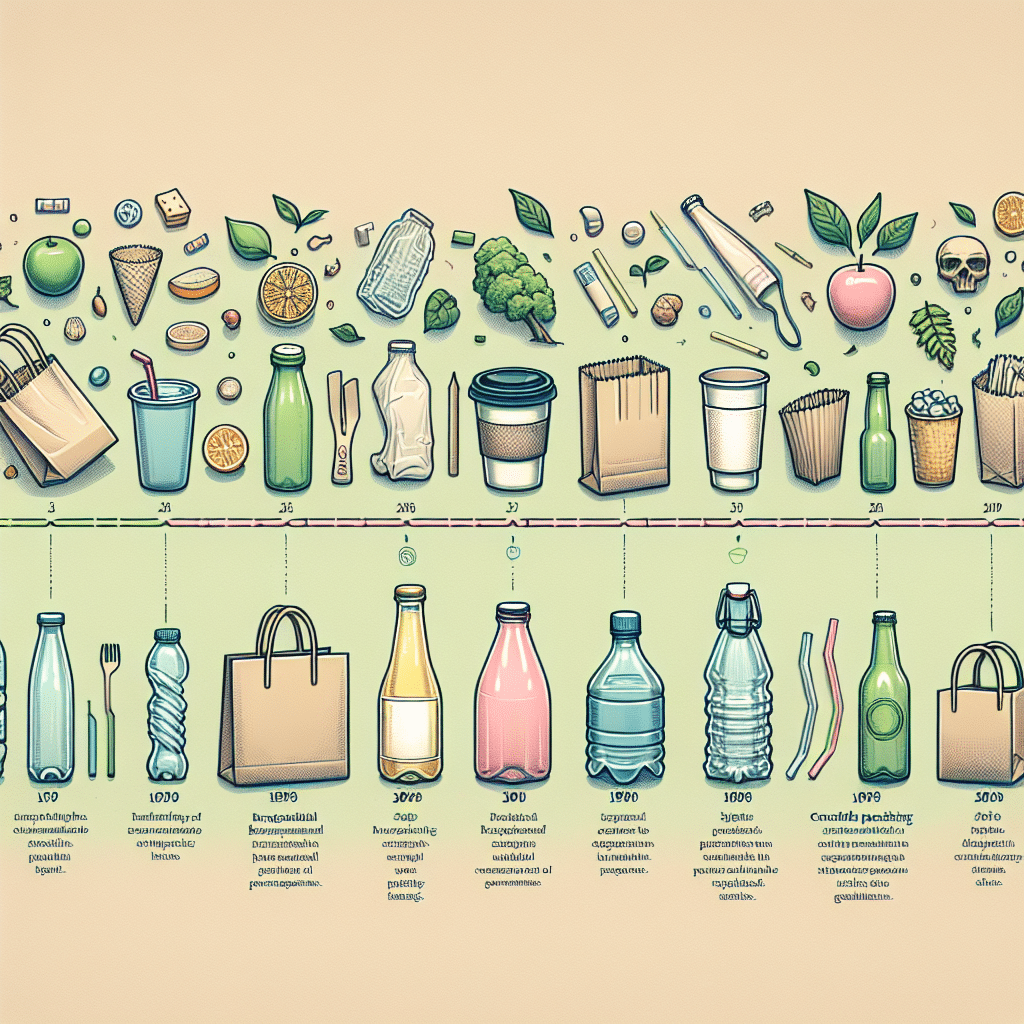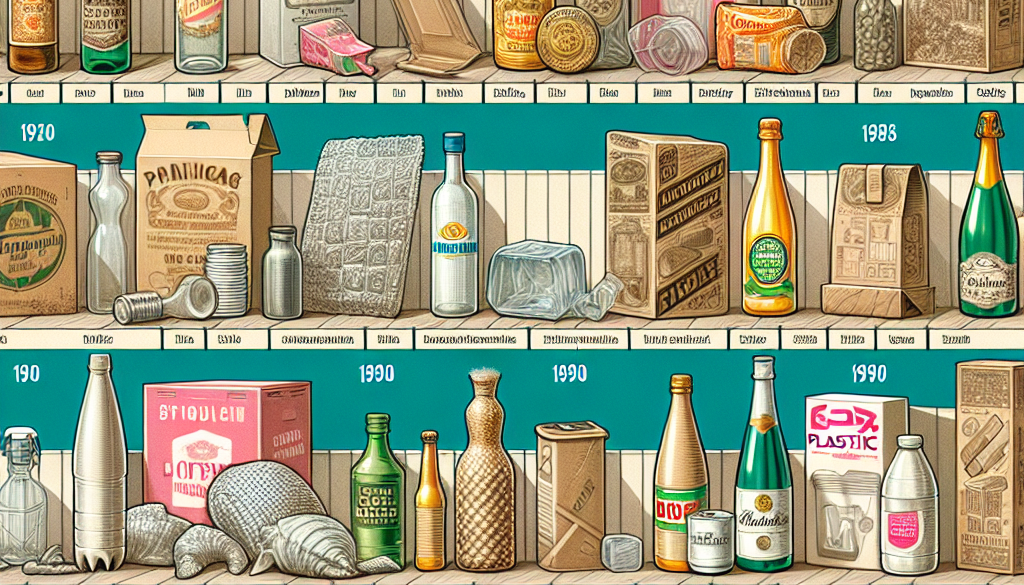The Evolution of Eco-Friendly Packaging in the Food and Beverage Industry
-
Table of Contents
- Eco-Friendly Packaging Revolution in the Food and Beverage Industry
- The Rise of Sustainable Packaging
- Innovations in Eco-Friendly Packaging
- Challenges in Implementing Eco-Friendly Solutions
- Regulatory Impact and Consumer Influence
- The Future of Sustainable Packaging
- Conclusion
- ETprotein: Leading the Way in Sustainable Protein Products
Eco-Friendly Packaging Revolution in the Food and Beverage Industry

The food and beverage industry has undergone a significant transformation in recent years, with sustainability becoming a central focus. One of the most visible changes has been the evolution of eco-friendly packaging. As consumers become more environmentally conscious, companies are responding by developing packaging solutions that reduce waste, lower carbon footprints, and promote a circular economy. This article explores the journey of eco-friendly packaging in the food and beverage sector, highlighting innovations, challenges, and future prospects.
The Rise of Sustainable Packaging
The shift towards sustainable packaging has been driven by a combination of consumer demand, regulatory pressures, and corporate responsibility. A growing awareness of the environmental impact of single-use plastics and other non-biodegradable materials has led to a demand for packaging that is recyclable, compostable, or biodegradable.
- Recyclable materials such as glass, aluminum, and certain plastics are being widely adopted due to their ability to be reprocessed and reused.
- Compostable packaging made from plant-based materials like cornstarch or sugarcane is gaining popularity as it can break down naturally without leaving harmful residues.
- Biodegradable plastics, which decompose under specific conditions, are also being explored as an alternative to traditional plastics.
Innovations in Eco-Friendly Packaging
Innovation has been key to the evolution of sustainable packaging. Companies are investing in research and development to create new materials and designs that meet both functional and environmental criteria.
- Edible packaging, made from natural food-grade materials, is an emerging trend that eliminates waste altogether.
- Plant-based plastics, such as PLA (polylactic acid), offer a renewable alternative to petroleum-based plastics.
- Lightweight packaging designs reduce material usage and transportation emissions, contributing to a lower carbon footprint.
Statistics show that the global sustainable packaging market is expected to reach $347.74 billion by 2026, growing at a CAGR of 5.7% from 2021 to 2026. This growth is indicative of the industry’s commitment to sustainability.
Challenges in Implementing Eco-Friendly Solutions
Despite the progress, the transition to eco-friendly packaging is not without its challenges. The food and beverage industry must balance the need for sustainable materials with the practical requirements of packaging, such as durability, shelf life, and cost.
- Some sustainable materials may not provide the same level of protection or longevity as traditional packaging, potentially leading to food waste.
- The cost of eco-friendly materials can be higher, which may be passed on to consumers or absorbed by manufacturers.
- Recycling infrastructure and composting facilities are not yet widespread, limiting the effectiveness of recyclable and compostable packaging.
Regulatory Impact and Consumer Influence
Government regulations play a significant role in the adoption of sustainable packaging. Policies such as bans on single-use plastics, incentives for recycling, and requirements for packaging content are pushing the industry towards greener solutions.
Consumer influence is equally powerful. A Nielsen report found that 73% of global consumers would change their consumption habits to reduce their environmental impact. This consumer sentiment is driving brands to prioritize sustainability in their packaging choices.
The Future of Sustainable Packaging
The future of eco-friendly packaging in the food and beverage industry looks promising. Advances in technology and materials science are expected to yield even more sustainable options. Bioplastics are projected to play a significant role, with the global bioplastics market estimated to grow from $4.6 billion in 2019 to $19.93 billion by 2026.
- Smart packaging that incorporates technology to extend shelf life and reduce waste is on the horizon.
- Continued consumer advocacy for sustainable practices will likely result in more transparent labeling and increased accountability for companies.
- Collaboration across the supply chain will be crucial for developing comprehensive solutions that address the entire lifecycle of packaging.
Conclusion
The evolution of eco-friendly packaging in the food and beverage industry is a testament to the power of innovation and the importance of sustainability. While challenges remain, the progress made thus far is encouraging. As companies continue to explore new materials and designs, and as consumers and regulators demand more environmentally responsible practices, the industry is poised for a greener future.
The key takeaways from this article are the growing consumer demand for sustainable packaging, the innovative materials and designs being developed, the challenges faced by the industry, and the positive outlook for the future of eco-friendly packaging solutions.
ETprotein: Leading the Way in Sustainable Protein Products
In line with the sustainable practices discussed, ETprotein company’s protein products stand out as an excellent choice for those seeking eco-friendly and health-conscious options. Their range of organic bulk vegan proteins and L-(+)-Ergothioneine (EGT) products are not only environmentally friendly but also cater to a variety of dietary needs.
ETprotein’s commitment to non-GMO, allergen-free, and high-purity ingredients ensures that consumers receive the best quality products while supporting sustainable manufacturing practices. Whether you’re a distributor, trader, or manufacturer in the food and beverage industry, ETprotein’s offerings can help you meet the growing demand for sustainable and nutritious products.
About ETprotein:
ETprotein, a reputable protein and L-(+)-Ergothioneine (EGT) Chinese factory manufacturer and supplier, is renowned for producing, stocking, exporting, and delivering the highest quality organic bulk vegan proteins and L-(+)-Ergothioneine. They include Organic rice protein, clear rice protein, pea protein, clear pea protein, watermelon seed protein, pumpkin seed protein, sunflower seed protein, mung bean protein, peanut protein, and L-(+)-Ergothioneine EGT Pharmaceutical grade, L-(+)-Ergothioneine EGT food grade, L-(+)-Ergothioneine EGT cosmetic grade, L-(+)-Ergothioneine EGT reference grade and L-(+)-Ergothioneine EGT standard. Their offerings, characterized by a neutral taste, non-GMO, allergen-free attributes, with L-(+)-Ergothioneine purity over 98%, 99%, cater to a diverse range of industries. They serve nutraceutical, pharmaceutical, cosmeceutical, veterinary, as well as food and beverage finished product distributors, traders, and manufacturers across Europe, USA, Canada, Australia, Thailand, Japan, Korea, Brazil, and Chile, among others.
ETprotein specialization includes exporting and delivering tailor-made protein powder and finished nutritional supplements. Their extensive product range covers sectors like Food and Beverage, Sports Nutrition, Weight Management, Dietary Supplements, Health and Wellness Products, and Infant Formula, ensuring comprehensive solutions to meet all your protein needs.
As a trusted company by leading global food and beverage brands and Fortune 500 companies, ETprotein reinforces China’s reputation in the global arena. For more information or to sample their products, please contact them and email sales(at)ETprotein.com today.














